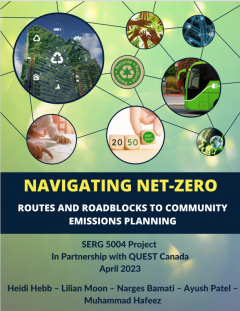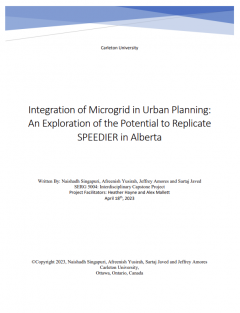Below is a sample of the final reports from previous capstone projects.
2023 Final Reports
Navigating Net-Zero: Routes and Roadblocks to Community Admission Planning
 Given Canada’s federal target of achieving net-zero emissions by 2050, community efforts to reduce emissions are critical. Communities are responsible for over 50% of Canada’s energy use and GHG emissions (QUEST, n.d.). Given this, this report aims to identify barriers and routes for Canadian communities to initiate and implement net-zero emissions plans. In partnership with QUEST Canada, six unique Canadian communities were interviewed with a series of questions to better understand the community’s aptitude in net-zero planning and various roadblocks to achieving their goals. As a practice in net-zero planning, a case study was undertaken based on common barriers that the interviewed communities face. This exercise examined a case where in Grande Prairie, an oil and gas resource-rich region, 50% of the pick-up trucks were electric vehicle models, with the hope to foster more conversation on the issue.
Given Canada’s federal target of achieving net-zero emissions by 2050, community efforts to reduce emissions are critical. Communities are responsible for over 50% of Canada’s energy use and GHG emissions (QUEST, n.d.). Given this, this report aims to identify barriers and routes for Canadian communities to initiate and implement net-zero emissions plans. In partnership with QUEST Canada, six unique Canadian communities were interviewed with a series of questions to better understand the community’s aptitude in net-zero planning and various roadblocks to achieving their goals. As a practice in net-zero planning, a case study was undertaken based on common barriers that the interviewed communities face. This exercise examined a case where in Grande Prairie, an oil and gas resource-rich region, 50% of the pick-up trucks were electric vehicle models, with the hope to foster more conversation on the issue.
It considers net-zero through the lens of just and durability and explores the concept of implementation within the context of a clean energy transition. The analysis highlighted several key findings and areas of potential intervention. Investing in human resources as a low-cost solution can have cascading impacts on a community’s net-zero planning. Regular monitoring and measurement by the communities show commitment and allow for quicker adaptation ensuring they are on the most efficient path to realize their goals. Recognizing that for Canada to meet its net-zero goal, everyone’s effort is required, especially communities given their contribution to emissions. However, due to the complexities of interregional activity, emissions counting would be best done at the provincial level to prevent carbon leakage. This implies that collaboration of stakeholders and partnerships between communities, provinces, and the federal government are essential to implementing and realizing the net-zero target in a just and durable way.
Integration of Microgrid in Urban Planning: An Exploration of the Potential to Replicate SPEEDIER in Alberta
 This report aims to conduct a thorough analysis of a proposed microgrid project that integrates wind and solar energy systems as primary distributed energy resources (DERs) for the SPEEDIER Project. The objective is to evaluate the feasibility of replicating this project in Devon, Alberta, with the aim of enhancing existing ecosystems and advancing the evolution of
This report aims to conduct a thorough analysis of a proposed microgrid project that integrates wind and solar energy systems as primary distributed energy resources (DERs) for the SPEEDIER Project. The objective is to evaluate the feasibility of replicating this project in Devon, Alberta, with the aim of enhancing existing ecosystems and advancing the evolution of
energy systems towards sustainability. The incorporation of wind and solar energy systems as primary DERs presents a promising solution to meet the growing energy demands while reducing the carbon footprint and promoting eco-friendliness.
The SPEEDIER Project successfully built a net-zero microgrid in Ontario, but its replication is not feasible in today’s policy climate due to strict laws rendering conventional net-metering practices impractical and uneconomical. Furthermore, the program was unique in that it was a grassroots solution that enjoyed strong public approval and simplified regulatory processes. Therefore, the benefits of simplified and expedited regulatory processes in conjunction with strong public approval cannot be understated. The modernization of the grid in the Town of Devon will have several positive impacts, including reducing greenhouse gas emissions, creating job opportunities, diversifying the energy market, and promoting a shift towards a net-zero smart community. The project’s lifespan is 25 years, and it will generate a profit of $2.5 million from wind energy, which will electrify 584 houses. Solar energy will produce 147 MWh and offset 160 kilo tonnes of carbon dioxide.
The report will undertake an in-depth assessment of the technical, financial, and environmental aspects of the proposed project to determine its suitability for replication in Devon, Alberta. Successful replication of the project is expected to significantly enhance existing ecosystems and promote the adoption of sustainable energy systems. The report’s findings will provide a valuable knowledge base for future research and contribute to ongoing efforts towards eco-friendliness and sustainability. The report recommends several actions for both the developer and the Town of Devon to execute the proposal successfully. These include engaging with civic actors, offering community incentives, leveraging pre-existing plans and strategies, ensuring key regulatory measures, securing a long-term power purchase agreement, and partnering with publicly owned financial institutions for low-cost financing solutions. Overall, the report concludes that the proposed microgrid project has the potential to serve as a model for future energy systems while enhancing existing ecosystems and promoting eco-friendliness and sustainability.
